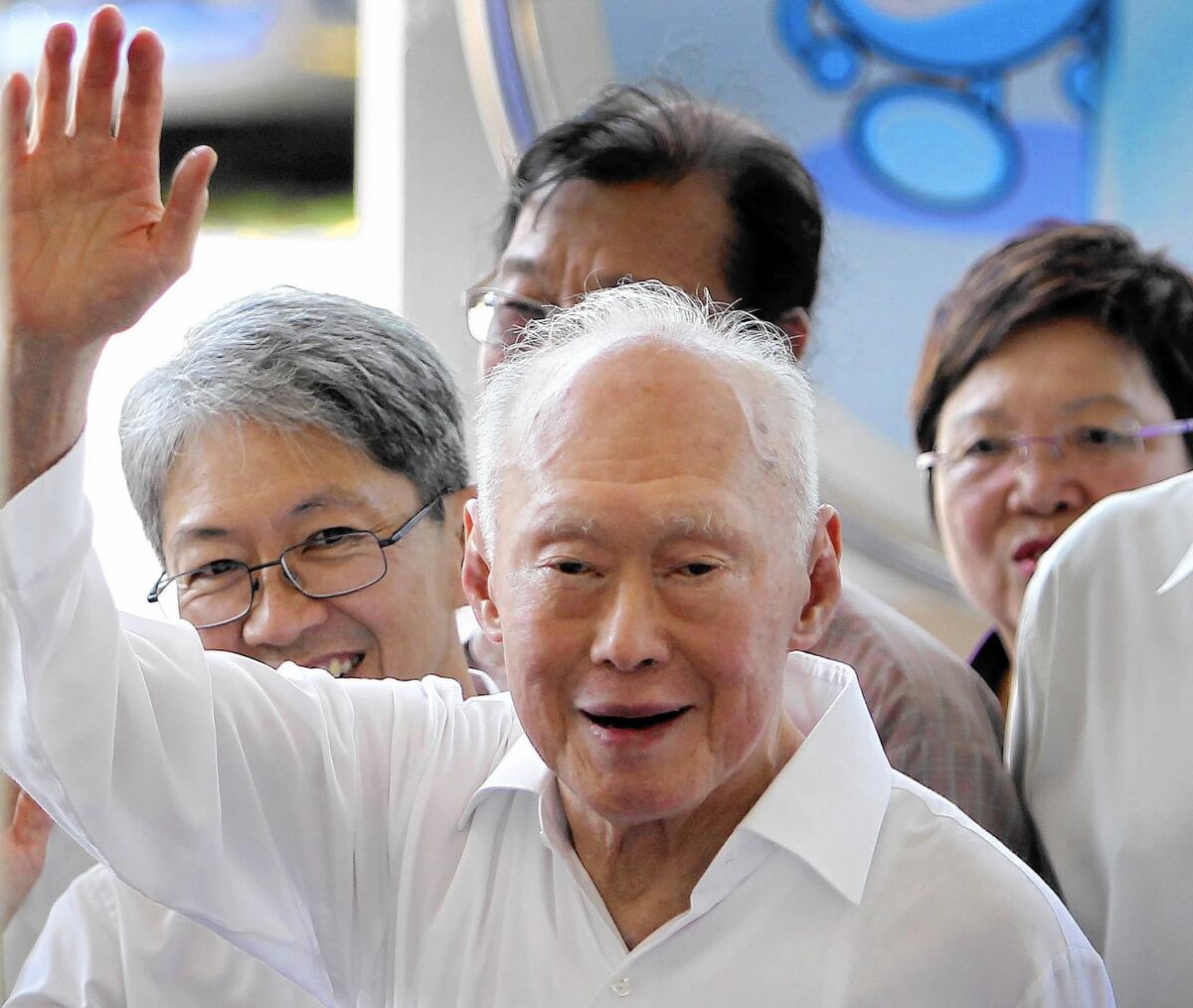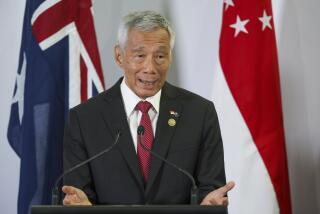Lee Kuan Yew dies at 91; stern leader built modern Singapore

He banned chewing gum, booted critical publications out of the country, and paid educated women to improve the gene pool by having more babies.
But Lee Kuan Yew, while presiding over a government that squelched dissent and characterizing opponents as “mediocrities and opportunists,” also transformed the backwater city-state of Singapore into one of the world’s most efficient and prosperous international business centers.
Lee, who had been hospitalized in Singapore for pneumonia, died early Monday at age 91. His death was announced by the Singapore prime minister’s office.
For more than 50 years Lee was among Southeast Asia’s most influential statesmen. Authoritarian, humorless, incorruptible, he reigned over his 240-square-mile island like a stern headmaster, corralling ethnic Chinese, Indians and Malays into a cohesive state, with English as a common language.
His legacy was an economic miracle with few parallels in the developing world, though in recent years Singapore’s nominally democratic system has come under increasing fire for stifling freedom of expression, open debate and public assembly.
Issues such as Internet restrictions and gay rights, along with rising income inequality, the country’s reliance on foreign labor and working conditions for migrants, have sparked increasing protests and discontent. Today, there are nearly 1.5 million non-resident foreigners in Singapore among a population of nearly 4 million citizens and permanent residents.
Lee became Singapore’s first prime minister in 1959, two years after colonial power Britain agreed to the territory’s self-rule, and his People’s Action Party has dominated the country’s politics ever since, never losing power.
He set out on a course to attract foreign investment and encourage capitalism. He embraced efficiency like a religion and believed the well-being of the community was more important than the rights of the individual.
Although Singapore has no agriculture, mining or resources — other than its industrious people — the island nation by the 1990s had become a global high-tech, transportation and manufacturing center that rivaled Hong Kong. It was Southeast Asia’s most modern city, its literacy rate was virtually 100%, and its per-capita income was the highest in the region, after oil-rich Brunei.
“I have spent a lifetime fighting against the odds,” Lee once said, “and they were very heavy odds, to build up confidence in Singapore, confidence of Singaporeans in their future and confidence of foreigners who will invest their fortunes in Singapore.”
Lee Kuan Yew (Kuan Yew translates as “the light that shines far and wide”) was born in Singapore on Sept. 16, 1923, to a Chinese family. Unlike many overseas Chinese, he never felt an affinity for the mainland. “I have no links with China, I have no friends in China,” he said in the 1960s.
During Japan’s World War II occupation of Singapore, Lee was forced into duty as a translator for Japan’s official news agency. After the war, with Singapore back under British colonial rule, he traveled on an Allied troop ship to England to study. He spent four months in London, hated the city and moved to Cambridge.
In Cambridge, where he rode a bicycle to classes, he proved to be a brilliant student. He studied law at Fitzwilliam House and completed his legal studies at the Middle Temple in London. There he became active in the Malayan Forum, a political group of students who sought an end to colonial rule in Malaya and Singapore.
“I did not find anything in Britain that justified their governing me,” Lee said. “They were not superior enough to be able to decide what is good for me. It reinforced my view that we should govern ourselves.”
Back in Singapore in the early 1950s, working as an attorney, he joined with the communists to form the People’s Action Party to fight for independence. Later, he wrested control of the party and used it to crush the communists.
In May 1959 he led the PAP to victory at the polls and the next month became prime minister of a self-governing but not fully independent Singapore.
One of his early achievements was persuading Malaya’s prime minister, Tunku Abdul Rahman, to merge with Singapore in 1963. But the Federation of Malaya was short-lived, and the two countries separated in 1965 amid increasing racial tensions between ethnic Chinese and Malays on the peninsula.
Lee reacted tearfully in public to the federation’s breakup. But he recovered quickly and set out to tackle the unexpected task of governing a fully independent Singapore and to meet the challenge of finding a place for Singapore in the world marketplace.
Singapore’s fraught early years would forever shape Lee’s thinking about how to govern and how fragile Singapore’s place in the world is. “The past has been a series of immense challenges over survival and deprivation,” he said in 1989. “We have secured our survival, although we can never banish danger.”
It also animated his arguments about why opposition politicians should not be allowed to govern.
“There is a heavy price to pay if mediocrities and opportunists ever take control of the government,” he said in 1982.
Such a scenario, he warned, was possible if citizens “in a fit of pique or a moment of madness voted for the politics of opposition for the sake of opposition. Five years of such a government … and Singapore will be down on her knees.”
Lee had a fearsome temperament, and ministers quaked in his presence. He did not tolerate dissent or corruption, and he exercised tight control over his people and the local media.
At various times he banned distribution of Time magazine, the Asian Wall Street Journal, Asiaweek and the Far Eastern Economic Review. In recent years, his successors in the PAP have pursued defamation lawsuits against those who would dare to question governmental policies in blog posts or other online forums.
Very much an elitist who believed “Asian values” made people of the region inherently superior, Lee established in 1983 a “graduate mothers” program that paid mothers with university degrees to have children and improve the gene pool. Uneducated people were offered rewards and punishments to induce them to limit family size. The policy was abolished after a public outcry.
Lee saw moral failings in the liberal democracy of the West and believed that “good government” and economic advancement were a more important national goal than individual liberties. He considered “so-called human rights” largely irrelevant to the growth of developing Asian nations.
Once asked whether Singapore — a country with so many restrictions that even chewing gum was barred — would slowly become more liberal, he replied:
“You mean more like a Western society, like Britain or America? I hope never. I think we’d go down the drain. We’d have more poor people in the streets, sleeping in the open, we’d have more drugs, more crime, more single mothers and delinquent children, a troubled society and a poor economy.”
Although often reprimanded by human rights activists, Lee remained a close friend of the United States throughout his political career. Even his harshest critics agreed on one point: The Singapore he built is one of Asia’s great success stories, with one of the world’s most efficient airports and ports.
A government-financed apartment program helped drive the nation’s homeownership rate to one of the highest in the world — 90.5% in 2013 for resident households, according to government statistics.
Singapore’s streets are clean and crime is low, and it is consistently ranked as one of the least corrupt countries in the world. According to a 2014 study by Boston Consulting Group, 10% of Singaporean households have more than $1 million in assets, the third-highest rate in the world behind only Qatar and Switzerland.
Lee resigned voluntarily after 31 years as prime minister in 1990, turning power over to his handpicked successor, Goh Chok Tong, but continued to play an influential role for two more decades, serving as senior minister and then “minister mentor” until 2011.
In 2004, Lee’s son, Lee Hsien Loong, became prime minister and continues to serve today.
Although Lee and his accomplishments still command enormous respect, a new generation of Singaporeans, who don’t have any firsthand memories of the tumultuous Singapore of the 1950s and ‘60s, are less deferential to the current leadership.
Catherine Lim, an outspoken critic of the PAP, recently penned an open letter to the current prime minster, Lee’s son, decrying a crisis of trust between Singaporeans and their government and an “emotional estrangement between your PAP leadership and the people.”
Singaporeans, she said, were willing to accord Lee Kuan Yew “much respect and trust (though with scant affection),” but today “they perceive the younger leaders after him as less deserving of these, and therefore not entitled to lecture and scold them as Mr. Lee used to do with impunity.
“Unlike the older generation who were grateful for simple amenities such as modern sanitation and clean streets, the new, better educated, globally exposed, Internet population demand much more.… This is an epochal time in Singapore’s history, when one era is fading into the past, and a new one is being transitioned into.”
Lamb is a former Times staff writer.
Special correspondent Violet Law in Hong Kong contributed to this report.
More to Read
Start your day right
Sign up for Essential California for the L.A. Times biggest news, features and recommendations in your inbox six days a week.
You may occasionally receive promotional content from the Los Angeles Times.







